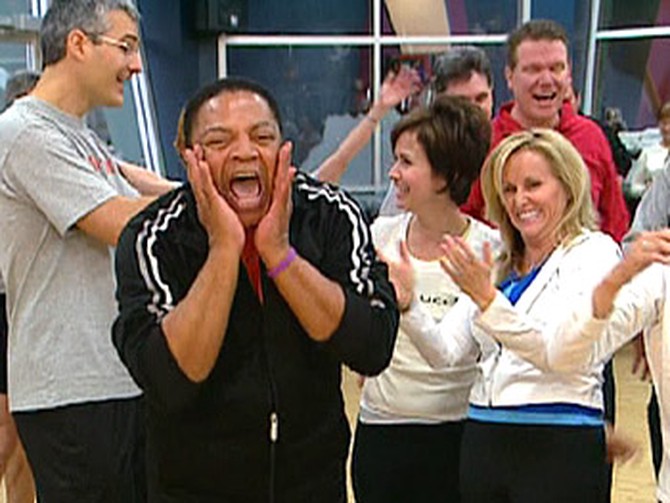Alternative Therapy Techniques
You might not have enough time to dig deep, but there's always enough time to put yourself first. Try these alternative methods of therapy for innovative, creative ways to help relieve your mental stresses.
Disclaimer: If you are seriously struggling with thoughts of suicide or depression, please seek professional help.
Disclaimer: If you are seriously struggling with thoughts of suicide or depression, please seek professional help.
By Stephanie Mitchell

Laughter Yoga
If you like to laugh (you better!), try laughter yoga. It can be done anytime, anywhere, so there's no excuse not to try it. Here's how the exercise routine works: A group gathers together to simulate laughter, which may feel forced and uncomfortable at first, but it quickly turns into real, authentic laughter. It's important to note that you're not telling jokes, but are simply enjoying the act of laughing.
In 2007, Oprah sent makeup artist, Reggie Wells, the biggest complainer she knows, to a laughing yoga class. The result? Reggie was enlightened by the new experience. "It was very goofy in the beginning, ... but you can't fake a laugh," Wells says. "Once you get into it, ... the stress lifted from my soul. It lifted from my body."
In 2007, Oprah sent makeup artist, Reggie Wells, the biggest complainer she knows, to a laughing yoga class. The result? Reggie was enlightened by the new experience. "It was very goofy in the beginning, ... but you can't fake a laugh," Wells says. "Once you get into it, ... the stress lifted from my soul. It lifted from my body."

Photo: © 2009 Jupiterimages Corporation
Mind-Body Therapies
You can get yourself so worked up mentally that you can make yourself physically ill. Your thoughts and feelings can have both good and bad effects on your body, so it's important to keep your mind well in order to keep your body healthy. A great way to do this is through mind-body therapies like meditation, prayer, yoga and guided imagery (using your mind and imagination to evoke relaxing and healing physical responses) that improve your mind's ability to influence your body.
Mind-body therapy can also help you if you're experiencing physical and mental pain. Dr. James Gordon, founder and director of the Center for Mind-Body Medicine, encourages people dealing with trauma to talk about the problem and teaches them how to manage stress through drawings and written exercises using guided imagery. "This uses all parts of their brains, and we think that may be one of the reasons they do so much better in dealing with trauma," he says.
Mind-body therapy can also help you if you're experiencing physical and mental pain. Dr. James Gordon, founder and director of the Center for Mind-Body Medicine, encourages people dealing with trauma to talk about the problem and teaches them how to manage stress through drawings and written exercises using guided imagery. "This uses all parts of their brains, and we think that may be one of the reasons they do so much better in dealing with trauma," he says.

Photo: © 2009 Jupiterimages Corporation
Reiki
If you're interested in energy therapies, consider Reiki. In this Japanese form of healing and therapeutic touch, energy is transmitting from the Reiki practitioner to the recipient. "Its premise is to draw from the universal energy, which we use to stay healthy, and to channel that through a Reiki practitioner into a client," says Dr. Christy Mack, a certified Reiki practitioner.
A healing practitioner will place her hands gently on specific areas of the body or above the body to bring relaxation and energy as well as minimize pain and anxiety. By placing her hands on or over you, the practitioner senses your energy imbalances and attempts to strengthen, correct or redirect the flow of energy in order to promote health and well-being. Dr. Erin Olivo, director of the Columbia Integrative Medicine Program says these methods haven't been well researched, but "there is some casual evidence to suggest they could be helpful in a wide variety of illnesses such as stress-related symptoms, pain, high blood pressure and other heart conditions."
A healing practitioner will place her hands gently on specific areas of the body or above the body to bring relaxation and energy as well as minimize pain and anxiety. By placing her hands on or over you, the practitioner senses your energy imbalances and attempts to strengthen, correct or redirect the flow of energy in order to promote health and well-being. Dr. Erin Olivo, director of the Columbia Integrative Medicine Program says these methods haven't been well researched, but "there is some casual evidence to suggest they could be helpful in a wide variety of illnesses such as stress-related symptoms, pain, high blood pressure and other heart conditions."

Photo: © 2009 Jupiterimages Corporation
Psychodrama
Does drama come naturally to you? Perhaps you thrive on theatrics? Get ready for your close-up because psychodrama may be just what you need. In this performance arts practice conceived by Dr. Jacob L. Moreno, you'll act out your problems, issues, concerns on an actual stage to reach a greater sense of self-awareness and understanding.
In psychodrama, the therapist plays the role of the director. The patient, or protagonist, and other group members, who are assigned supporting roles, then act out scenes provided by the therapist to better understand the patient's behaviors in a safe and supportive environment.
In psychodrama, the therapist plays the role of the director. The patient, or protagonist, and other group members, who are assigned supporting roles, then act out scenes provided by the therapist to better understand the patient's behaviors in a safe and supportive environment.

Photo: © 2009 Jupiterimages Corporation
Breathing Exercises
One of the best ways to calm yourself down when you feel your blood begin to boil is to simply stop what you're doing and take a deep breath. Many times, we take breathing for granted, but by concentrating on the simple act of taking in and letting out air, you can actually decrease tension in your body and relieve anxiety.
The practice of deep breathing can also increase your energy, according to Dr. Woodson Merrell, author of Power Up: Unleash Your Natural Energy, Revitalize Your Health and Feel 10 Years Younger. He recommends taking breathing breaks to focus on your breath for about two minutes every hour on the hour. "It makes a dramatic difference in lowering down the level of stress and calming your nervous system," Dr. Merrell says.
Try this introductory breathing exercise!
The practice of deep breathing can also increase your energy, according to Dr. Woodson Merrell, author of Power Up: Unleash Your Natural Energy, Revitalize Your Health and Feel 10 Years Younger. He recommends taking breathing breaks to focus on your breath for about two minutes every hour on the hour. "It makes a dramatic difference in lowering down the level of stress and calming your nervous system," Dr. Merrell says.
Try this introductory breathing exercise!

Photo: © 2009 Jupiterimages Corporation
Hypnotherapy
How trusting are you? Enough to let someone direct your thoughts while you're in an altered state of consciousness? Hypnotherapy uses the power of the mind and imagination to help address issues directly through the unconscious mind while you're in a trance-like state or induced into a prolonged sleep.
A qualified hypnotist will put a patient in a trance by repeating a command in a soothing, monotonous tone of voice that allows her to relax her body and focus on her breathing. While in this trance, therapists are able to intervene in the patient's mind to attempt to treat mental, psychosomatic and physical disorders. If you are really resistant to change or unable to break a bad habit like smoking, or if you're trying to achieve emotional balance, hypnosis might work for you.
A qualified hypnotist will put a patient in a trance by repeating a command in a soothing, monotonous tone of voice that allows her to relax her body and focus on her breathing. While in this trance, therapists are able to intervene in the patient's mind to attempt to treat mental, psychosomatic and physical disorders. If you are really resistant to change or unable to break a bad habit like smoking, or if you're trying to achieve emotional balance, hypnosis might work for you.

Photo: © 2009 Jupiterimages Corporation
Online Support Groups
For every life situation, whether you're going through a divorce, depression or the loss of a child, you can find the support you're looking for online. Online support groups are a great way to voice your questions, comments and concerns and have others reach out to you in your time of need. These support groups are convenient, too, offering instant encouragement from the comfort of your own home.
Search through some of Oprah's online support group message boards
How Facebook helped Lisa Ling through tough times
Search through some of Oprah's online support group message boards
How Facebook helped Lisa Ling through tough times

Photo: © 2009 Jupiterimages Corporation
Walk-and-Talk Sessions
Step away from your computer and get some face-to-face interaction with others. Susan Shapiro, author of Speed Shrinking, practices "walk and talks" or "walking office hours" to help clear her mind and relieve stress.
She usually takes her walking partner to New York City's Central Park for a power walk. "You can really connect with somebody walking for an hour," she says. After ending a 27-year, two-pack-a-day smoking habit and quitting drinking, it's tough for her to go to restaurants and bars, so being productive, getting outdoors and exercising is her alternative. I do it almost every day," she says. "It's a stress reliever in so many ways, I feel completely invigorated."
Find out about Shapiro's speed-shrinking concept
She usually takes her walking partner to New York City's Central Park for a power walk. "You can really connect with somebody walking for an hour," she says. After ending a 27-year, two-pack-a-day smoking habit and quitting drinking, it's tough for her to go to restaurants and bars, so being productive, getting outdoors and exercising is her alternative. I do it almost every day," she says. "It's a stress reliever in so many ways, I feel completely invigorated."
Find out about Shapiro's speed-shrinking concept

Photo: © 2009 Jupiterimages Corporation
Volunteerism
Volunteering is a productive way to help yourself by helping others in the process. According to research conducted by the Corporation for National and Community Service, people who volunteer have greater longevity, higher functional ability, lower rates of depression and less heart disease. So it benefits your mental health and your physical health as well.
There are many ways to help others based on your availability, interest and skills. Robert Rosenthal, director of communications at VolunteerMatch, suggests asking yourself the following four questions to figure out the best volunteer opportunity for you:
There are many ways to help others based on your availability, interest and skills. Robert Rosenthal, director of communications at VolunteerMatch, suggests asking yourself the following four questions to figure out the best volunteer opportunity for you:
- What kind of work do you want to do?
- What is your availability?
- Is there a specific cause you care about?
- Do you want to volunteer alone or with a group of friends and family?

Photo: © 2009 Jupiterimages Corporation
Musical Therapy
Music therapy uses the power of sound to bring about emotional healing and reduce stress and pain. Therapy sessions include listening to music, making music or a combination of both.
Why is music so beneficial to us? Along with its power to bond you with other people, music actually shapes your brain. "Perhaps this is so because musical activity involves many parts of the brain—emotional, motor and cognitive areas—even more than we use for our other great human achievement, language," Dr. Oliver Sacks says. "This is why it can be such an effective way to remember or to learn."
Why is music so beneficial to us? Along with its power to bond you with other people, music actually shapes your brain. "Perhaps this is so because musical activity involves many parts of the brain—emotional, motor and cognitive areas—even more than we use for our other great human achievement, language," Dr. Oliver Sacks says. "This is why it can be such an effective way to remember or to learn."

Photo: iStockphoto
Relationship Seminars
If you feel your relationship could use a little love, consider taking a couples seminar or workshop. One benefit of a seminar is that there's no commitment to return once you've tried it. If your schedule allows for it, try a weekend marriage seminar to get away from your everyday stresses—work, kids, bills—and focus on getting your relationship back on track.
To supplement your newfound knowledge from a seminar, try Dr. Berman's weekly sex homework assignments. Every week, she offers tasks to improve your sex life. The more help you get, the faster you're on track to achieving good mental, physical and spiritual health.
To supplement your newfound knowledge from a seminar, try Dr. Berman's weekly sex homework assignments. Every week, she offers tasks to improve your sex life. The more help you get, the faster you're on track to achieving good mental, physical and spiritual health.
Keep Reading
Published 10/15/2009




